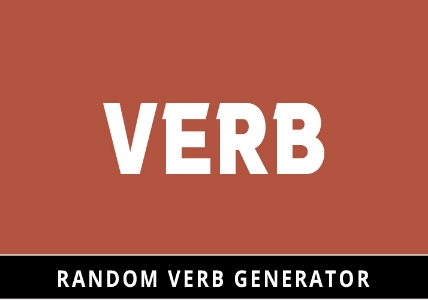Our random verb generator is a tool designed to assist writers in overcoming creative blocks, sparking inspiration, and diversifying their vocabulary. Whether you're a seasoned writer looking for fresh ideas or a novice seeking guidance, this tool can be invaluable in your creative process.
How to Use Our Random Verb Generator?
- Step #1. Head over to our Random Verb Generator. tool.
- Step #2. Input the number of verbs you want.
- Step #3. Select "Generate" to receive a randomly generated verb.
- Step #4. If you need more verbs, repeat the process as needed.
Understanding Verbs: Definitions and Types
A verb is a part of speech that expresses an action, occurrence, or state of being. It is a vital component of a sentence, serving as the predicate or main element that indicates what the subject is doing or experiencing.
Verbs are conjugated to reflect various grammatical aspects, such as tense, mood, voice, and aspect, depending on the context of the sentence.
There are several types of verbs, each fulfilling specific functions within a sentence:
-
Action Verbs
These verbs show what the subject does. For example, "think," "write," "dance," "run," and "eat" are action verbs.
-
Linking Verbs
These verbs link the subject of a sentence to a description, which can be a noun, pronoun, or adjective. They don't show action but describe a state of being or condition. Common linking verbs include "appear," "become," "be," "seem," "feel," and "look."
-
Auxiliary Verbs (Helping Verbs)
Auxiliary verbs are used alongside main verbs to form verb phrases, express tense, mood, voice, or aspect, and convey additional meaning or information. Examples of auxiliary verbs include "have," "do," "be," "will," "shall," "can," "could," "may," "might," "must," and "should."
-
Modal Verbs
Modal verbs express the speaker's attitude, intention, ability, necessity, or possibility regarding the action of the main verb. They often indicate modality or likelihood and are used to convey permission, obligation, ability, or probability. Common modal verbs include "shall," "should," "will," "can," "could," "may," "might," "must," "would," and "ought to."
-
Transitive Verbs
These verbs need a direct object to make sense in a sentence. They transfer the action from the subject to the direct object. For instance, in the sentence "She ate an apple," "ate" is the transitive verb, and "an apple" is the direct object.
-
Intransitive Verbs
These verbs don't need a direct object to make sense. They express actions or states without involving an object. For example, in the sentence "He ran," "ran" is an intransitive verb because it doesn't require an object to complete its meaning.
-
Regular and Irregular Verbs
Verbs are classified as regular or irregular based on their conjugation patterns in different tenses. Regular verbs follow predictable conjugation rules, while irregular verbs have unique or irregular conjugation forms. For example, "walk" (regular) becomes "walked" in the past tense, while "go" (irregular) becomes "went" in the past tense.
Understanding the various types of verbs is essential for constructing grammatically correct sentences and conveying meaning effectively in writing and communication.
Know more about Verb on Wikipedia
Quick Answers: Random Verb Generator FAQs
-
Why use a random verb generator?
By generating random verbs, writers can explore new ideas, break through writer's block, and enhance their vocabulary, leading to more dynamic and engaging writing.
-
How does a verb randomizer assist writers?
Our verb randomizer is designed to help writers overcome creative blocks, spark inspiration, and diversify their vocabulary.
-
What is the importance of understanding verbs?
Verbs are fundamental to constructing grammatically correct sentences and conveying meaning effectively in writing and communication.
-
What are the types of verbs explained in this guide?
This guide covers various types of verbs, including Action Verbs, Linking Verbs, Auxiliary Verbs, Modal Verbs, Transitive Verbs, Intransitive Verbs, and Regular and Irregular Verbs.
-
Can you provide examples of each type of verb?
Certainly! Examples are provided for each type of verb in the guide to illustrate their usage and clarify their functions in sentences.


